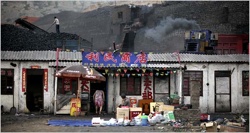“The nation is broken but mountains and rivers are still there (ÂõΩÁ†¥Â±±Ê≤≥Âú®)” is a famous line from a poem written by Tang Dynasty poet Du Fu (AD 712-770). Today, some Chinese turned Du Fu’s line into “The nation is still there but mountains and rivers are broken” (ÂõΩÂú®Â±±Ê≤≥Á†¥). Searching for this altered Chinese phrase online, there are already 26500 articles. The world also has noticed China’s environmental crisis: the following article is part of a new feature on the New York Times website called “Choking on Growth,”: “A series of articles and multimedia examining the human toll, global impact and political challenge of China’s epic pollution crisis.”
No country in history has emerged as a major industrial power without creating a legacy of environmental damage that can take decades and big dollops of public wealth to undo.
But just as the speed and scale of China’s rise as an economic power have no clear parallel in history, so its pollution problem has shattered all precedents. Environmental degradation is now so severe, with such stark domestic and international repercussions, that pollution poses not only a major long-term burden on the Chinese public but also an acute political challenge to the ruling Communist Party. And it is not clear that China can rein in its own economic juggernaut.
Public health is reeling. Pollution has made cancer China’s leading cause of death, the Ministry of Health says. Ambient air pollution alone is blamed for hundreds of thousands of deaths each year. Nearly 500 million people lack access to safe drinking water. [Full Text]
[Image source: nytimes.com]








